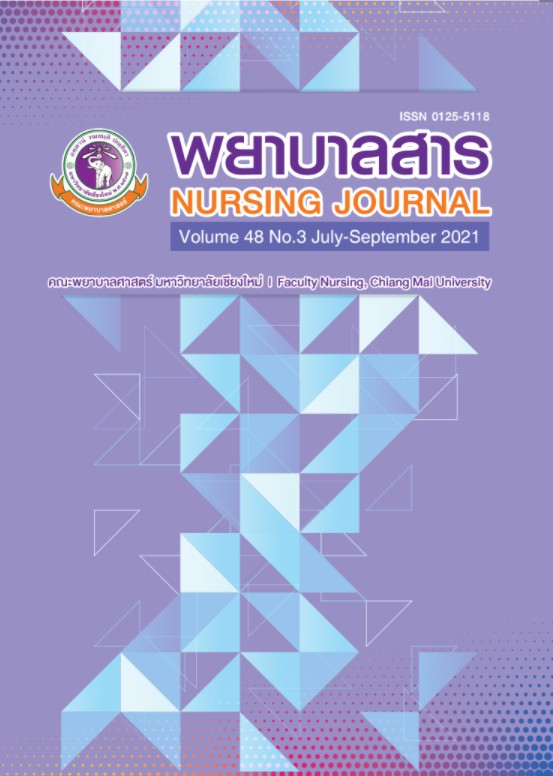Factors Influencing Readiness for Hospital Discharge in Knee Replacement Patients
Keywords:
Knees arthroplasty, Readiness for hospital dischargeAbstract
As people’s life expectancy gets longer worldwide, health issues related to the knees of the aging body are inevitably prevalent. While knee replacement can improve the overall quality of life, the treatment may at times cause complications leading to hospitalization. An in-depth understanding of the factors influencing readiness for hospital discharge is crucial to develop the interventions to reduce potential downstream complications effectively. This correlational research study was used to describe factors influencing readiness for hospital discharge among patients with a knee replacement. The sample consisted of 108 patients with osteoarthritis who had a knee replacement at a tertiary hospital. The research instruments consisted of questionnaires on the following topics: (1) Perceived social support; (2) Continuity of Care; and (3) Teaching quality. All research instruments were tested for content validity and reliability. Descriptive statistics and Pearson's Product Moment Correlation Coefficients and stepwise multiple regression analysis were used for data analysis.
The results of study showed that: participants had a moderate level of readiness for hospital discharge (x̄ = 8.09, SD = 1.14). Perceived social support and teaching quality were found to be significantly correlated with readiness for hospital discharge (r = .644, p <.01) and (r = .459, p <.01) respectively.
Perceived social support and teaching quality concerning discharge positively affect readiness for hospital discharge. These findings can be used to improve nursing interventions regarding discharge planning for patients undergoing knee replacement. Further studies aimed at testing nursing interventions for promoting social support and patient teaching should be done.
References
Anusasananun, B., Sucamvang, W., Udomkhamsuk, W., Sangwattanarat, K., Timnakron,W.,& Na Ayutthaya, K. (2015). Predicting factors of readiness for hospitals discharge among surgical hospitalized patients in tertiary hospital. Nursing Journal, 42(3), 24-34. (in Thai)
Barsoum, W. K., Murray, T. G., Klika, A. K., Green, K., Miniaci, S. L., & Wells, B. J. (2010). Predicting patient discharge disposition after total joint arthroplasty in the United States. The Journal of Arthroplasty, 25(6), 885-92. doi: 10.1016/j.arth.2009.06.022.
Businesswire, Wire. Global knee replacement market 2020-2024: Evolving opportunities with Conformis Inc. and DJO Global Inc. Technavio [Internet]. (2020). Retrieved from: https://www.businesswire.com/news/home/20200114005483/en /Global-Knee-Replacement-Market-2020-2024-Evolving-Opportunities.
Causey-Upton, R., Causey-Upton, R., Howell, D. M., Howell, D. M., Kitzman, P. H., Kitzman, P. H., … Dressler, E. V. (2019). Factors influencing discharge readiness after total knee replacement. Orthopaedic Nursing, 38(1), 6-14
doi: https://doi.org/10.1097/NOR.0000000000000513.
Cross, M., Smith, E., Hoy, D., Nolte, S., Ackerman, I., Fransen, M., ... & March, L. (2014). The global burden of hip and knee osteoarthritis: Estimates from the global burden of disease 2010 study. Annals of the rheumatic diseases, 73(7), 1323-1330. doi:10.1136/annrheumdis-2013-204763
Hasap, M., Hasap, M., & Nasae, T. (2014). Knowledge and capabilities of primary caregivers in providing quality care for elderly patients with post-operative hip fracture, Songkhlanagarind Hospital. Songklanagarind Journal of Nursing, 34(2), 53-66. (in Thai).
Holm, B., Bandholm, T., Lunn, T.H., Husted, H., Aalund, P.K., & Hansen, T.B. (2014). Role of preoperative pain, muscle function, and activity level in discharge readiness after fast-track hip and knee arthroplasty. Acta Orthopaedica, 85(5), 488-92. doi: 10.3109/17453674.2014.934186.
Kunthakhu, S., Watthanakitkrileart, D., Pongthavornkamol, K., & Dumavibhat, C. (2009). Factors influencing readiness for hospital discharge in acute myocardial infarction patients. Journal of Nursing Science, 27(2), 83-91. (in Thai)
Loft, M., McWilliam, C., & Ward-Griffin, C. (2003). Patient empowerment after total hip and knee replacement. Orthopaedic Nursing, 22(1), 42-47. doi: 10.1097/00006416-200301000-00012.
Meleis, A. I., Sawyer, L. M., Im, E. O., Messias, D.K.H., & Schumacher, K. (2000). Experiencing transitions: An emerging middle-range theory. ANS Advances in Nursing Science, 23(1), 12-28. doi: 10.1097/00012272-200009000-00006
Poncharoen, P., Samartkit, N., & Keeratiyutawong, P. (2015). Factors related to discharge readiness in patients with congestive heart failure. Nursing Journal of the Ministry of Public Health, 25(2), 130-43. (in Thai)
Rönn, K., Reischl, N., Gautier, E. & Jacobi, M. (2011). Current surgical treatment of knee osteoarthritis. Arthritis, 20(11), 454873. doi: 10.1155/2011/454873
Thanyasawad, T., Sappayanon, S., Thongklom, C., Kogchana, W., Moolsin, P., & Boonthuk, P. (2018). A study of barthel activities of daily living in elderly patients hip replacement. Journal of The Royal Thai Army Nurses, 19(1), 201-209. (in Thai)
Wattanasu, S. (2018). National health security fund handbook: Managing medical services by head and public health service budgets for dependent seniors. Bangkok: Sangchan Printing Partnership. (in Thai)
Weiss, M. E., & Piacentine, L. B. (2006). Psychometric properties of the readiness for hospital discharge scale. Journal Nursing Measurement, 14(3), 163-180. doi: 10.1891/jnm-v14i3a002
Weiss, M. E., Piacentine, L. B., Lokken, L., Ancona, J., Archer, J., & Gresser, S. (2007). Perceived readiness for hospital discharge in adult medical-surgical patients. Clinical Nurse Specialist, 21(1), 31-42. doi: 10.1097/00002800-200701000-00008
Wongpakaran, N., & Wongpakaran, T. (2012). A revised Thai multi-dimensional scale of perceived social support. The Spanish Journal of Psychology, 15(3), 1503-1509 doi: https://doi.org/10.5209/rev_SJOP.2012.v15.n3.39434.
Zimet, G. D., Dahlem, N. W., Zimet, S. G., & Farley, G. K. (1988). The multidimensional scale of perceived social support. Journal of personality assessment, 52(1), 30-41. doi: https://doi.org/10.1207/s15327752jpa5201_2.
Downloads
Published
How to Cite
Issue
Section
License
บทความที่ได้รับการตีพิมพ์เป็นลิขสิทธิ์ของวารสารพยาบาลสาร
ข้อความที่ปรากฏในบทความแต่ละเรื่องในวารสารวิชาการเล่มนี้เป็นความคิดเห็นส่วนตัวของผู้เขียนแต่ละท่านไม่เกี่ยวข้องกับมหาวิทยาลัยเชียงใหม่ และคณาจารย์ท่านอื่นๆในมหาวิทยาลัยฯ แต่อย่างใด ความรับผิดชอบองค์ประกอบทั้งหมดของบทความแต่ละเรื่องเป็นของผู้เขียนแต่ละท่าน หากมีความผิดพลาดใด ๆ ผู้เขียนแต่ละท่านจะรับผิดชอบบทความของตนเองแต่ผู้เดียว






